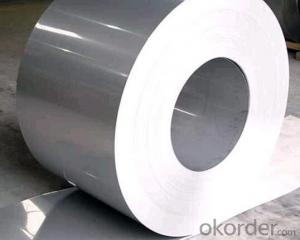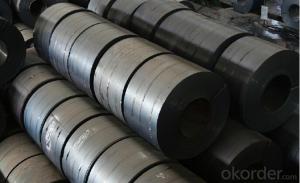Grade ASTM A653-CS-B Galvanized Steel Coil
- Loading Port:
- Tianjin
- Payment Terms:
- TT OR LC
- Min Order Qty:
- 3 m.t.
- Supply Capability:
- 10000 m.t./month
OKorder Service Pledge
OKorder Financial Service
You Might Also Like
Item specifice
Grade ASTM A653-CS-B Galvanized Steel Coil
Specification of Grade ASTM A653-CS-B Galvanized Steel Coil
1. Galvanized Steel Coil
(1) Width: 600-1570mm
(2) Thickness: 0.13-5.0mm
(3) Grade: JIS G3302-SGCC-SGC570, SGCH (full hard-G550), SGHC-SGH540
EN10346-DX51D+Z, DX53D+Z, S250GD-S550GD
STM A653-CS-B, SS255-SS550
(4) Zinc Coating: Z40g/m2~Z500g/m2 (both side total coating thickness)
2. Galvalume Steel Coil
(1) Width: 600~1500mm
(2) Thickness: 0.15~2.30mm
(3) Grade: JIS G3321-SGLCC, SGLC400-570, (G550)
EN10346-DX51D+AZ, DX53D+AZ, S250-S550
ASTM A792M CS-B, SS255-SS550
(4) AZ Coating: AZ50~AZ185g/m2
3. Prepainted Galvanized Steel Coil (PPGI)
(1) Width: 600~1250mm
(2) Thickness: 0.19~1.50mm
(3) Grade: JIS G3312-CGCC, CGC340-570, (G550)
ASTM A755M CS-B, SS255-SS550
(4) Zinc Coating: Z40g/m2~Z500g/m2 (both side total coating thickness)
4. Prepainted Galvanized Steel Coil (PPGL)
(1) Width: 600~1250mm
(2) Thickness: 0.20~1.50mm
(3) Grade: JIS G3322-CGLCC, CGLC340-570, (G550)
ASTM A755M CS-B, SS255-SS550
(4) AZ Coating: AZ50~AZ185g/m2 (both side total coating thickness)
5. Cold Rolled Steel Coil (Soft) (for further information, pls click the product name)
(1) Width: 600~1570mm
(2) Thickness: 0.13~2.50mm
(3) Grade: JIS G3141-SPCC-SD, SPCD-SD, SPEC-SD
JIS G3135-SPFC 340/390/440
EN10130-DC01, DC03, DC04
SAE1006, SAE1008
ASTM A424-TypeⅡ
6. Cold Rolled Steel Coil (Full Hard) (for further information, pls click the product name)
(1) Width: 600~1570mm
(2) Thickness: 0.13~2.50mm
(3) Grade: JIS G3141-SPCC-1B, SPCC-1D
7. Hot Rolled Steel Coil
(1) Width: 1000~1524mm
(2) Thickness: 1.20~16.5mm, other thickness can be negotiation
(3) Grade: JIS G3101-SS400, JIS G3132-SPHT1/2/3, ASTM A36, Q195, Q235 etc.
Company Introduction of the Grade ASTM A653-CS-B Galvanized Steel Coil
CNBM International Corporation is the most import and export platform of CNBM group(China National Building Material Group Corporation) ,which is a state-owned enterprise, ranked in 270th of Fortune Global 500 in 2015.
With its advantages, CNBM International are mainly concentrate on Cement, Glass, Iron and Steel, Ceramics industries and devotes herself for supplying high quality series of refractories as well as technical consultancies and logistics solution.
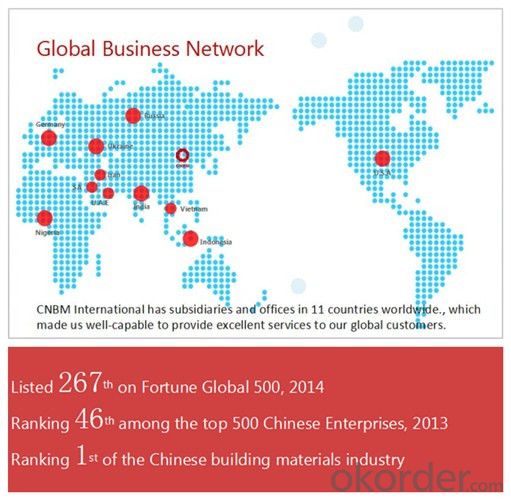
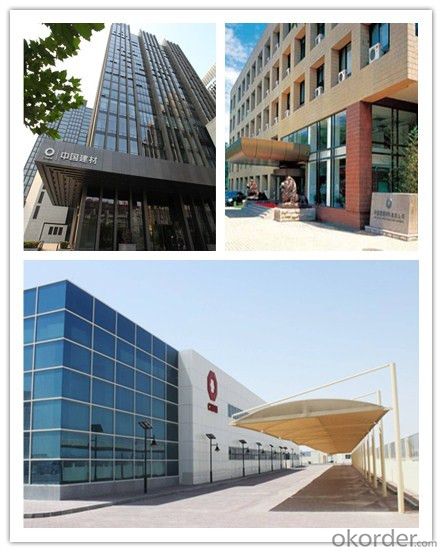
Packaging & Delivery of the Grade ASTM A653-CS-B Galvanized Steel Coil
Packaging Detail | Sea worthy packing /as per customer's packing instruction |
Delivery Detail | 15 ~ 40 days after receiving the deposit |
Products Show:
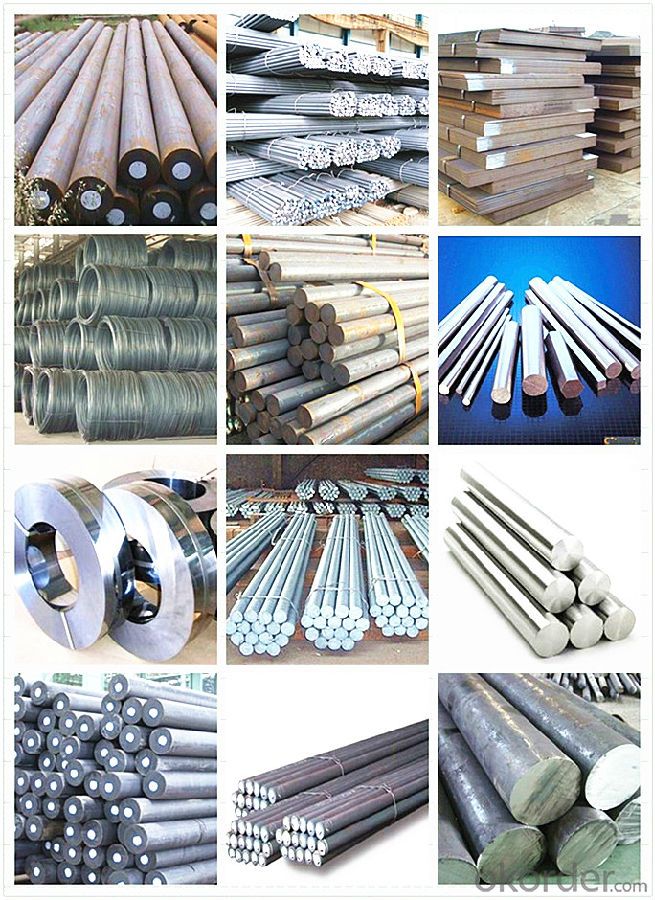
FAQ:
Are you a trading company or manufacturer? | Manufacturer |
What’s the MOQ? | 3 metric ton |
What’s your delivery time? | 15-35 days after downpayment received |
Do you Accept OEM service? | Yes |
what’s your delivery terms? | FOB/CFR/CIF |
What's the Payment Terms? | 30% as deposit,70% before shipment by T/T |
Western Union acceptable for small amount. | |
L/C acceptable for large amount. | |
Scrow ,Paybal,Alipay are also ok | |
Why choose us? | Chose happens because of quality, then price, We can give you both. Additionally, we can also offer professional products inquiry, products knowledge train (for agents), smooth goods delivery, excellent customer solution proposals. |
What's your available port of Shipment? | Main Port, China |
What’s your featured services? | Our service formula: good quality+ good price+ good service=customer's trust
|
Where are your Market? | Covering more than 160 countries in the world |
- Q:How is shock-resistant steel used in the production of impact tools?
- Shock-resistant steel is used in the production of impact tools to enhance their durability and resistance to breaking or chipping under high impact forces. This steel has been specifically designed to absorb and distribute the energy created by the impact, thereby preventing any damage or deformation to the tool. By using shock-resistant steel, impact tools can withstand heavy usage and deliver consistent performance, making them ideal for applications where repeated high-force impacts are involved, such as construction, automotive, or manufacturing industries.
- Q:How does special steel contribute to the automotive racing aftermarket industry?
- The automotive racing aftermarket industry relies heavily on special steel, which provides the necessary strength, durability, and performance for high-performance racing vehicles. In this industry, where speed, precision, and safety are of utmost importance, special steel offers exceptional properties that enable engineers and manufacturers to push performance limits. One significant contribution of special steel to the automotive racing aftermarket industry is its ability to endure extreme conditions. Racing vehicles face intense heat, pressure, and vibrations during high-speed races, which can place immense stress on various components. Special steel, with its outstanding heat resistance and high tensile strength, ensures that critical parts like engine components, transmission gears, and suspension systems can withstand these harsh conditions while maintaining optimal performance and safety. Furthermore, special steel's lightweight nature makes it an ideal material for racing vehicle components. Reducing weight is crucial in racing as it directly affects acceleration, handling, and overall performance. By utilizing special steel, manufacturers can create lighter yet stronger components, allowing racing teams to achieve higher speeds, improved maneuverability, and enhanced fuel efficiency. Special steel also contributes to the automotive racing aftermarket industry through its excellent machinability and weldability. This enables precise customization and modification of components according to the specific needs and preferences of racing teams. Whether it involves creating custom engine blocks, exhaust systems, or chassis reinforcements, special steel provides the necessary flexibility to optimize performance and gain a competitive edge. Moreover, the use of special steel in the automotive racing aftermarket industry promotes innovation and technological advancements. Steel manufacturers continuously develop new alloys and compositions that enhance the performance capabilities of racing vehicles. These advancements can include improved corrosion resistance, enhanced fatigue strength, and superior material properties, all of which contribute to the overall performance and longevity of racing vehicle components. In conclusion, special steel plays a vital role in the automotive racing aftermarket industry. Its unique combination of strength, durability, lightweight properties, and machinability allows racing teams to design and manufacture high-performance vehicles capable of withstanding extreme conditions. By leveraging the advantages of special steel, the industry can continue pushing the boundaries of automotive racing, delivering faster, safer, and more efficient racing machines.
- Q:How does special steel contribute to the aerospace industry?
- Special steel contributes to the aerospace industry by offering several key benefits. Its high strength-to-weight ratio makes it ideal for constructing lightweight yet durable components, improving fuel efficiency and overall performance of aircraft. Additionally, its exceptional resistance to corrosion, heat, and extreme conditions ensures the longevity and reliability of aerospace structures. Special steel also enables the production of intricate and complex parts, enhancing the design flexibility and safety of aircraft.
- Q:How does special steel contribute to the dimensional stability of products?
- Special steel is known for its high strength, durability, and resistance to deformation, making it an ideal material for enhancing the dimensional stability of products. By utilizing special steel in the manufacturing process, products are less likely to experience changes in shape or size due to external factors such as temperature fluctuations or mechanical stress. This improved dimensional stability ensures that the products maintain their intended form and functionality over time, leading to increased reliability and customer satisfaction.
- Q:What are the different methods of testing special steel for quality assurance?
- There are several methods of testing special steel for quality assurance, including mechanical testing, chemical analysis, non-destructive testing, and metallographic analysis. Mechanical testing involves measuring the steel's strength, hardness, and toughness through techniques such as tensile testing, impact testing, and hardness testing. Chemical analysis helps determine the composition and impurities in the steel through methods like spectroscopy and elemental analysis. Non-destructive testing methods like ultrasonic testing, magnetic particle testing, and radiographic testing are used to detect any defects or flaws in the steel without causing damage. Metallographic analysis involves examining the steel's microstructure through techniques like optical microscopy and electron microscopy to assess its internal structure and identify any potential issues.
- Q:How is special steel stored and transported?
- Special steel is stored and transported with utmost care to ensure its quality and integrity are maintained. Firstly, during storage, special steel is kept in a controlled environment with appropriate temperature and humidity levels to prevent any corrosion or damage. It is often stored in covered warehouses or storage facilities specifically designed for steel, offering protection from environmental factors such as rain, snow, and sunlight. When it comes to transportation, special steel is transported using various methods depending on the quantity and distance. For short distances, smaller quantities can be transported by trucks equipped with flatbeds or enclosed trailers. These trucks are designed to securely hold and protect the steel during transit, preventing any shifting or damage. However, for longer distances or larger quantities, special steel is often transported via rail or sea. Rail transportation ensures a smooth and stable journey, reducing the risk of damage due to vibrations or sudden movements. Steel is loaded onto specially designed railcars that provide secure storage and protection during transit. Sea transportation involves loading the steel onto shipping containers or directly onto specialized vessels. Containers are sealed and secured to prevent any movement or damage during the journey. Specialized vessels, such as roll-on/roll-off ships or heavy-lift vessels, are used for transporting oversized or extremely heavy steel components. In all cases, special steel is carefully packaged and secured using appropriate materials, such as wooden crates, steel strapping, or plastic wrapping, to prevent any scratches or dents. Additionally, the transportation process is closely monitored, and any necessary precautions are taken to ensure the steel arrives at its destination in optimal condition. Overall, the storage and transportation of special steel require meticulous planning, proper handling, and the use of specialized equipment to safeguard its quality and protect it from any potential damage or degradation.
- Q:How is special steel used in the packaging supply chain?
- Special steel is commonly used in the packaging supply chain for manufacturing various types of packaging machinery and equipment. It is utilized to create robust and durable components such as blades, cutters, molds, and dies that are essential for shaping, cutting, and forming packaging materials. The strength, hardness, and wear resistance properties of special steel make it ideal for withstanding the high pressures and repetitive movements involved in the packaging process. Additionally, special steel is also used in the construction of storage racks and shelves, ensuring the safe and secure storage of packaged goods throughout the supply chain.
- Q:What are the different methods of surface thermal spraying for special steel?
- There are various techniques available for surface thermal spraying on special steel. These techniques consist of: 1. Flame spraying: This method involves melting the coating material using a flame or oxy-fuel source, and then spraying it onto the special steel surface. It is commonly utilized for applying coatings like zinc, aluminum, or their alloys. 2. Arc spraying: In arc spraying, the coating material is melted using an electric arc and then propelled onto the special steel surface using compressed air. This technique is often employed for applying coatings such as stainless steel, nickel alloys, or copper. 3. Plasma spraying: Plasma spraying employs a plasma torch to heat and melt the coating material, which is then propelled onto the special steel surface. It is especially effective for applying coatings with high melting points like ceramic or metallic materials. 4. High-velocity oxy-fuel (HVOF) spraying: HVOF spraying uses a high-pressure combustion process to propel the coating material onto the special steel surface. This technique produces coatings with high bond strength and density, making it suitable for applications that require wear resistance or corrosion protection. 5. Detonation spraying: Detonation spraying involves a controlled detonation process to accelerate the coating material onto the special steel surface. It is often used for applying coatings such as tungsten carbide or other hard materials, providing excellent wear resistance. Each of these surface thermal spraying methods offers unique advantages and is chosen based on the specific requirements of the special steel application, including the desired coating material, thickness, and performance characteristics.
- Q:Can special steel be used in the defense sector?
- Indeed, in the defense sector, special steel finds itself as a viable option. Special steel, which encompasses alloys or compositions designed with specific attributes such as high strength, hardness, resistance to corrosion, or heat resistance, proves to be suitable for a range of defense applications. These applications include the construction of armored vehicles, naval vessels, aircraft, and weaponry. Within the defense sector, special steel serves as a valuable resource for manufacturing components and structures necessitating exceptional strength and durability. For instance, it can be utilized to produce armor plates for tanks and armored vehicles, which must endure high impact and ballistic threats. Additionally, special steel can be employed in the construction of naval vessels, providing corrosion resistance and enhancing overall structural integrity. Furthermore, the defense industry heavily relies on special steel for manufacturing aircraft parts and weaponry. Aircraft components, such as landing gear, engine parts, and structural elements, demand materials of high strength to ensure safe and reliable operation. Special steel alloys fulfill this requirement by providing the necessary strength and resistance to extreme conditions, including high temperatures and pressures, making them an ideal choice for these applications. Moreover, special steel plays a vital role in the production of various types of weapons, such as firearms and blades. Its exceptional strength and hardness properties render it suitable for manufacturing gun barrels, bulletproof vests, and knives employed by military personnel. To summarize, special steel holds significant value within the defense sector due to its exceptional properties, including strength, hardness, corrosion resistance, and heat resistance. Its extensive applications in the construction of armored vehicles, naval vessels, aircraft, and weaponry ensure the safety, durability, and effectiveness of military equipment.
- Q:What are the requirements for special steel used in industrial equipment manufacturing?
- To ensure the suitability of special steel for use in demanding applications in industrial equipment manufacturing, certain requirements must be met. These requirements include: 1. Exceptional strength: Given the heavy loads that industrial equipment often encounters, special steel must possess superior strength properties to withstand these forces. It should exhibit high levels of yield strength, tensile strength, and hardness to prevent deformation or failure. 2. Resistance to corrosion: Industrial environments are frequently subject to corrosion caused by exposure to chemicals, moisture, or extreme temperature fluctuations. Therefore, special steel used in such applications should possess excellent corrosion resistance to prevent degradation and ensure long-term performance. 3. High resistance to wear: The friction, abrasion, and impact experienced by industrial equipment often lead to significant wear. Consequently, special steel needs to exhibit exceptional wear resistance to maintain its integrity and prevent premature failure. 4. Toughness and resistance to impact: Industrial settings can subject equipment to sudden shocks, impacts, or vibrations. To withstand such events, special steel should demonstrate good toughness and resistance to impact, absorbing energy and resisting fracture or cracking. 5. Ability to withstand high temperatures: Certain industrial processes expose equipment to high temperatures or rapid temperature changes. Special steel must exhibit excellent heat resistance, retaining its strength, hardness, and other mechanical properties even at elevated temperatures. 6. Ease of machining: Special steel used in industrial equipment manufacturing should be easy to machine, facilitating the fabrication process. It should allow for simple cutting, drilling, welding, and other machining operations without excessive tool wear or damage to the material. 7. Dimensional stability: Equipment components must maintain their shape and dimensions under various operating conditions. Special steel needs to exhibit dimensional stability to prevent warping, distortion, or dimensional changes that could impact the performance or assembly of the equipment. By meeting these requirements, special steel used in industrial equipment manufacturing can endure harsh conditions, deliver reliable performance, and have a long service life. Ultimately, this contributes to the overall efficiency and productivity of industrial processes.
1. Manufacturer Overview |
|
|---|---|
| Location | |
| Year Established | |
| Annual Output Value | |
| Main Markets | |
| Company Certifications | |
2. Manufacturer Certificates |
|
|---|---|
| a) Certification Name | |
| Range | |
| Reference | |
| Validity Period | |
3. Manufacturer Capability |
|
|---|---|
| a)Trade Capacity | |
| Nearest Port | |
| Export Percentage | |
| No.of Employees in Trade Department | |
| Language Spoken: | |
| b)Factory Information | |
| Factory Size: | |
| No. of Production Lines | |
| Contract Manufacturing | |
| Product Price Range | |
Send your message to us
Grade ASTM A653-CS-B Galvanized Steel Coil
- Loading Port:
- Tianjin
- Payment Terms:
- TT OR LC
- Min Order Qty:
- 3 m.t.
- Supply Capability:
- 10000 m.t./month
OKorder Service Pledge
OKorder Financial Service
Similar products
New products
Hot products
Related keywords
